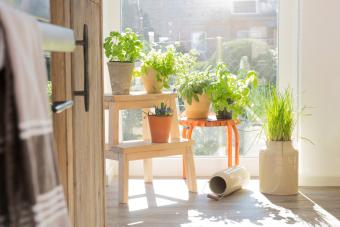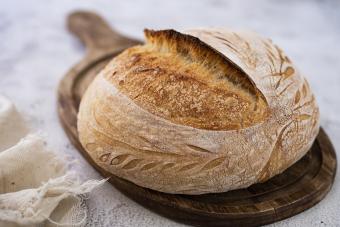
Cooking with fresh herbs can add a whole new dimension to your meals. It can also be a bit intimidating to those who haven't used herbs before. How do you know which herbs to use? What do you do with them once you get them? This interview with culinary expert Leslie Bilderback will help eliminate some of the confusion.
Interview with Leslie Bilderback
Leslie Bilderback is a Certified Master Baker and chef who has been delighting people with her culinary prowess for 20 years. She has worked in some of the most prestigious restaurants in the world. Leslie shares her expertise as a master instructor at Le Cordon Bleu Academy and the California School of Culinary Arts. She has also published several books including The Everything Family Nutrition Book, The Complete Idiot's Guide to Comfort Food and The Complete Idiot's Guide to Spices and Herbs, among others.
In the following interview, Leslie also shares her expertise as she explains the many virtues of cooking with fresh herbs. Follow Leslie's advice and see what you can apply to your next culinary masterpiece!
Cooking with Fresh Herbs
LoveToKnow: Why are herbs important for cooking?
Leslie Bilderback: They add flavor, nutrition, and they make foods interesting. More importantly, they also give foods a cultural identity. Chicken breast cooked in saffron means something completely different than a chicken breast cooked in cinnamon, or cilantro, or rosemary.
LTK: Why are so many people intimidated by herbs?
LB: I don't think people are intimidated. I think they are simply unfamiliar. I blame that on fast food, canned soup and microwave dinners. That's why I wrote CIG Spices and Herbs, to help folks become more familiar and to show them their spice and herb potential. My goal is to get more people back in the kitchen, cooking real food, not just defrosting and re-heating.
Fresh or Dry
LTK: Is purchasing dried herbs as good as fresh?
LB: It is not a question of as good as. They serve different purposes and have different flavors. They each have their place in the culinary arts but many cooks, including professionals, think that they are interchangeable. When they are used as substitutes for each other, the outcome will always be different. Your tongue will know.
LTK: How long are dry herbs good for?
LB: They will keep for years, but their flavor diminishes as time goes by. Be sure to smell and taste your dried herbs. If you haven't opened the jar in a while, chances are your recipe will be better served with a new batch. In CIG to Spices and Herbs, there is a chapter devoted to preserving the flavor of spices and herbs through drying, freezing, and infusions.
LTK: What should be considered when selecting herbs to purchase?
LB: Freshness. Choose herbs like you would choose fresh flowers. They should look good. Stems should be firm and upright with bright colored leaves that are intact, with no bruising, torn or discolored leaves. CIG to Spices and Herbs describes in detail the features to look for when purchasing every spice and herb, as well as ways to keep them fresh longer.
Using Herbs
LTK: Can culinary herbs provide medicinal benefits when used in foods?
LB: Culinary herbs were all medicinal herbs in the beginning. Almost everything we eat has health benefits. The simple act of eating a plant, any plant, is a healthful practice.
Herbs' medicinal applications vary, of course, and they depend a lot on potency, application, and even beliefs. My book discusses the origin of each spice and herb, including their ancient and modern medicinal uses.
LTK: What are the best herbs for beginners to have on hand?

LB: The most commonly referenced herbs are:
- Basil
- Thyme
- Rosemary
- Parsley
- Cilantro
The best ones to have are the ones you like and the ones you can easily obtain. See what your market carries, or try your hand at gardening. My book has an easy beginners guide to herb gardening.
LTK: Which herbs are most versatile?
LB: There are certain herbs that pop up in several cultures, like cilantro (also known as fresh coriander and Chinese parsley) and basil, so if you enjoy cooking ethnically, those are a couple of good ones to have on hand.
Chervil and Italian parsley are mild and lend themselves easily to a variety of other flavors. For stronger flavored herbs and spices, check out my book which has a paring chart to help cooks combine flavors.
LTK: What are your favorite herbs and why?
LB: My favorite spice is cardamom, mostly because it reminds me of Christmas. I use a lot of nutmeg too, because I was trained by a French chef that used it in everything. He kept a nutmeg nut and grater in his pocket at all times.
Cilantro is one of my favorite herbs to use, probably because I live in Southern California, which has a strong Mexican influence. But my favorite thing ever is to use whatever is growing right now, out in my yard. (Lots of thyme this time of year.)
More Tips
LTK: What tips can you share to help people try new things with herbs?
LB: Taste your herbs raw and try to imagine what might go well with it. Next try it with some other taste elements - something salty, something sweet, something bitter, and something sour. This is a great taste experiment, explained in detail in my book, that chefs use to create well-paired dishes.
LTK: What else would you like to share with readers about culinary herbs?
LB: Try something new. Go to a new market, maybe one that carries foods from a specific culture that is new to you, and pick something you've never tried. Then take it home and cook with it.
There is no right or wrong way to use herbs. Yes, there are traditional ways, but your own taste and creativity is just as important. Just go for it!
LoveToKnow would like to thank Leslie Bilderback for sharing her expertise on cooking with fresh herbs. To purchase her books or learn more about cooking mouth-watering meals, visit her website The Culinary Masterclass. It instructs home cooks in classical culinary techniques and has weekly recipes based on the season.







